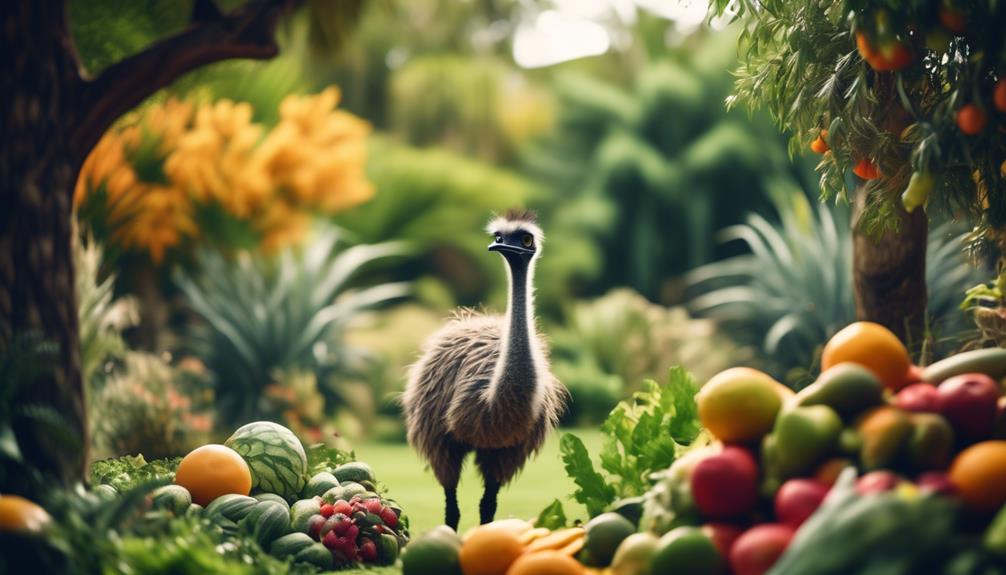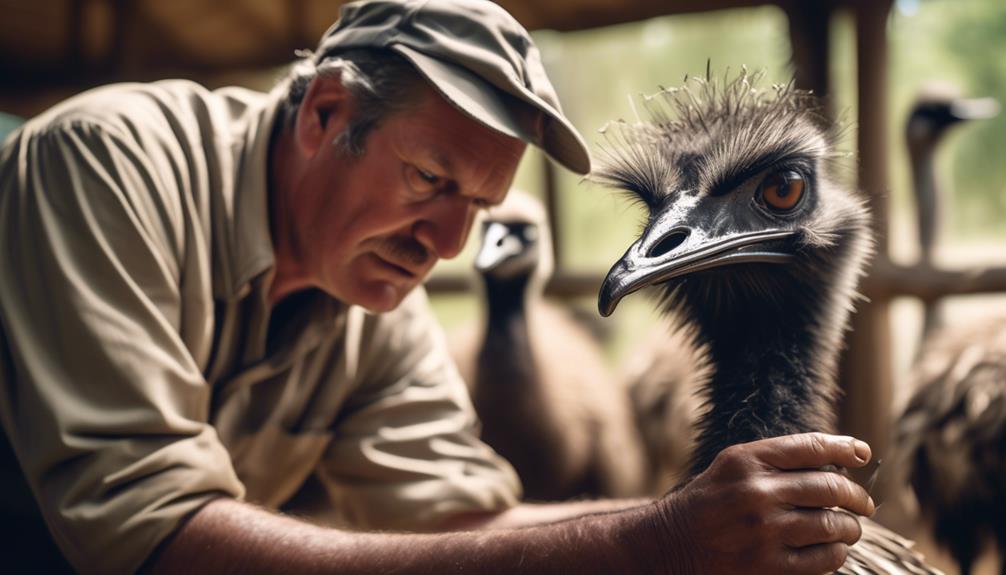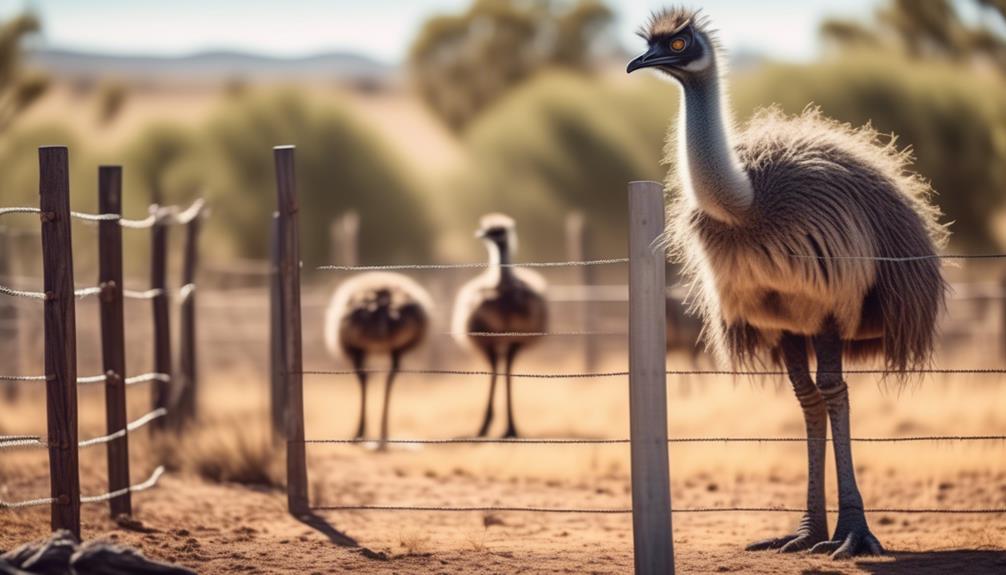
Are you considering venturing into the world of emu farming? Before you take the leap, it's important to understand the challenges that come with this unique industry.
From meeting the dietary requirements of these fascinating birds to navigating the complexities of breeding and hatching, there are numerous obstacles to overcome.
Understanding emu behavior, managing their health and wellness, and successfully marketing and selling emu products are all crucial aspects of this endeavor.
Additionally, financial considerations, navigating regulations, and building a network of support are equally important.
In this discussion, we will explore the challenges of emu farming and provide valuable insights on how to overcome them, ensuring your success in this industry.
Emu Dietary Requirements

Emus have specific dietary requirements that must be met in order to ensure their health and well-being. Emu feed requirements are unique and must be carefully considered when planning their diet. Emus are omnivorous, meaning they eat both plants and insects. Their nutrition needs consist of a balanced combination of proteins, carbohydrates, fats, vitamins, and minerals.
To meet their protein requirements, emus can be fed with a variety of sources, including high-protein grains, such as soybeans and sunflower seeds. Insects, such as crickets and mealworms, can also be included in their diet to provide additional protein. Carbohydrates are essential for energy, and emus can be fed with grains like corn and barley, as well as fruits and vegetables.
Fats are important for emus' overall health and can be provided through the inclusion of seeds and nuts in their diet. Emus also require a variety of vitamins and minerals to support their immune system and maintain proper bodily functions. These can be obtained through a combination of fruits, vegetables, and specially formulated emu feed supplements.
It is crucial to ensure that emus have access to clean, fresh water at all times to maintain hydration. Water is vital for digestion and temperature regulation. Monitoring the emus' feed intake and regularly adjusting their diet based on their nutritional needs is essential for their overall well-being.
Breeding Difficulties
Breeding emus can present a range of challenges due to their unique reproductive behaviors and specific requirements. Emus are known for their complex courtship rituals, which involve vocalizations, dancing, and feather displays. Understanding these behaviors is crucial for successful breeding.
One of the main difficulties in emu breeding is the limited availability of breeding pairs. Emus reach sexual maturity at around two years of age, and it can be challenging to find genetically diverse pairs for optimal offspring production. To overcome this, emu farmers often collaborate with other breeders to exchange birds and diversify their gene pool.
Another challenge is the need for effective breeding techniques. Emus have a low fertility rate and require precise conditions for successful reproduction. Artificial insemination is commonly used in emu breeding to overcome this challenge. It allows breeders to control genetic diversity and increase the chances of producing healthy offspring.
To ensure genetic diversity, it is important to carefully select breeding pairs based on their lineage and genetic traits. Maintaining a diverse gene pool is essential for the long-term health and vitality of the emu population. Emu breeders must also monitor the genetic health of their birds regularly to prevent inbreeding and maintain the overall quality of the flock.
Breeding emus requires expertise, patience, and a deep understanding of their unique reproductive behaviors. By employing effective breeding techniques and prioritizing genetic diversity, emu farmers can overcome the challenges and ensure a thriving population of these fascinating birds.
| Breeding Difficulties |
|---|
| Limited availability of breeding pairs |
| Low fertility rate |
| Need for effective breeding techniques |
Egg Hatching Challenges

Successfully hatching emu eggs can pose various challenges due to their unique characteristics and specific requirements.
Emu eggs require precise incubation techniques and careful temperature control to ensure successful hatching.
When it comes to incubation techniques, it's crucial to maintain the right temperature and humidity levels. Emu eggs require a consistent temperature of around 97 to 99 degrees Fahrenheit (36 to 37 degrees Celsius) throughout the incubation period. Fluctuations in temperature can lead to developmental issues and even death of the embryos. Additionally, it's important to maintain a humidity level of around 25 to 35 percent during the first 45 days, gradually increasing it to 60 percent during the final days of incubation.
Temperature control is a critical aspect of emu egg hatching. It's recommended to use a reliable and accurate incubator to maintain the desired temperature consistently. Regular monitoring and adjustment of the temperature are necessary to ensure optimal conditions for the developing embryos.
To improve the hatching success rate, it's essential to handle the eggs with utmost care. Emu eggs should be stored in a cool and stable environment before incubation. Avoid sudden movements or jarring, as it can damage the delicate embryos inside.
Understanding Emu Behavior
To gain a comprehensive understanding of emu behavior, it's crucial to observe their natural instincts and social interactions in various environments. Emus are social creatures that exhibit complex socialization patterns. They form small groups called 'crews' that consist of several individuals. Within these crews, they establish a hierarchy based on dominance and submission. Understanding their social dynamics is essential for successful emu farming.
Key points to consider when observing emu behavior:
- Emu socialization: Emus are highly social animals that thrive in the presence of their peers. They engage in various social behaviors such as grooming, preening, and vocalizations. Observing these interactions can provide valuable insights into their social structure and individual roles within the group.
- Emu communication: Emus communicate through a range of vocalizations, body postures, and displays. These communication signals play a vital role in establishing dominance, attracting mates, and warning others of potential threats. By studying their communication patterns, farmers can better understand their needs and respond accordingly.
- Environmental impact: Emus display different behaviors in different environments. Observing their behavior in both natural and farm settings can help farmers create appropriate living conditions that cater to their natural instincts and promote their well-being.
- Behavioral changes: Emus, like any other animal, may exhibit behavioral changes due to factors such as stress, illness, or changes in their environment. By closely monitoring their behavior, farmers can identify and address any issues promptly, ensuring the health and welfare of their emus.
Managing Emu Health and Wellness

Managing the health and wellness of your emus is crucial for their overall well-being and productivity. Emu veterinary care plays a vital role in ensuring that your birds remain healthy and disease-free. Regular check-ups by a qualified emu veterinarian are essential to detect any potential health issues early on and provide appropriate treatment. Vaccinations are also necessary to protect your emus from common diseases such as avian influenza and Newcastle disease.
Emu stress management is another important aspect of maintaining their health. Emus can be sensitive creatures, and stress can negatively impact their immune system, making them more susceptible to diseases. Providing a calm and comfortable environment is crucial to minimize stress levels. This includes ensuring adequate space, proper ventilation, and clean water and feed.
Regular monitoring of your emus' behavior and physical condition is essential to identify any signs of illness or distress. Look out for symptoms such as loss of appetite, lethargy, abnormal feces, or respiratory problems. Prompt action should be taken if any of these signs are observed, including contacting your emu veterinarian for advice and treatment.
Emu Housing and Infrastructure
When creating housing and infrastructure for your emus, it's important to consider their specific needs and requirements. Emus require a well-designed and maintained housing system to ensure their comfort, health, and productivity. Here are some key considerations for emu housing design and infrastructure maintenance:
- Shelter: Emus need a sheltered area that protects them from extreme weather conditions, such as excessive heat or cold. The shelter should provide ample space for emus to move around comfortably and should be well-ventilated to promote good air circulation.
- Fencing: Emus are large birds that can jump and run at high speeds. Therefore, it's crucial to have sturdy fencing that's at least 6 feet high to prevent them from escaping. Additionally, the fencing should be designed to keep predators out and emus safe within their designated area.
- Flooring: Emus have delicate legs and feet, so the flooring of their housing should be smooth, non-slippery, and easy to clean. Avoid flooring materials that can cause injuries or foot problems, such as sharp edges or rough surfaces.
- Water and Feeding Facilities: Emus require access to clean water and proper feeding facilities. Ensure that water sources are easily accessible and regularly cleaned and maintained. Feeding facilities should be designed to prevent food wastage and contamination.
Maintaining the infrastructure of emu housing is crucial for the well-being of your emus and the success of your farm. Regular inspections, repairs, and cleaning are essential to prevent structural issues and ensure a healthy environment for your emus.
Dealing With Predator Threats

Now let's address the important aspect of safeguarding your emus from potential predator threats. Protecting your emu enclosures is crucial to ensure the safety and well-being of your birds.
Emus are vulnerable to a variety of predators, such as foxes, coyotes, and dogs. To effectively deter these predators and keep your emus safe, it's essential to employ predator deterrents.
One effective predator deterrent is the use of secure fencing. Make sure your emu enclosures are surrounded by sturdy fencing that's at least six feet high. This will prevent predators from easily accessing the emus and protect them from potential harm.
In addition to secure fencing, you can also consider installing predator deterrent devices. These devices emit sounds or flashes of light that scare away predators. Motion-activated lights and sirens can be effective in deterring nocturnal predators, while scarecrows and reflective tape can help deter birds of prey.
Another important aspect of protecting your emu enclosures is regular monitoring and maintenance. Regularly inspect the fencing for any signs of damage or weakness. Secure any holes or gaps immediately to prevent predators from finding their way into the enclosures.
Marketing and Selling Emu Products
To effectively market and sell your emu products, it's important to develop a strategic plan that targets your desired customer base and highlights the unique qualities and benefits of your products. Emu product marketing strategies can help you reach your potential customers and create a demand for your products.
Here are a few strategies to consider:
- Identify your target market: Determine who your ideal customers are and tailor your marketing efforts to appeal to their needs and preferences. Consider factors such as age, lifestyle, and geographical location when identifying your target market.
- Showcase the benefits: Emu products offer various benefits, such as being low in fat and high in protein. Highlight these advantages in your marketing materials to attract health-conscious consumers looking for nutritious alternatives.
- Utilize social media: Social media platforms provide an excellent opportunity to reach a wide audience and engage with potential customers. Create compelling content, share customer testimonials, and offer exclusive promotions to generate interest and build brand loyalty.
- Overcome online selling challenges: Selling emu products online can present some unique challenges. Be sure to address concerns such as product quality, shipping logistics, and customer trust. Provide detailed product descriptions, offer secure payment options, and consider partnering with reputable online marketplaces to enhance your online presence.
Financial Considerations and Budgeting

Developing a comprehensive financial plan and budget is crucial for successful emu farming operations. To ensure profitability, it's important to conduct a thorough profitability analysis. This involves evaluating the potential income from emu products such as meat, oil, feathers, and leather, as well as the associated costs of production, including feed, housing, healthcare, and marketing. By carefully analyzing these factors, you can determine the financial viability of your emu farming venture.
In addition to profitability analysis, effective risk management strategies are essential for long-term success. Emu farming isn't without its risks, such as disease outbreaks, market fluctuations, and unpredictable weather conditions. By implementing risk management strategies, such as diversifying your product offerings, establishing contingency plans, and maintaining adequate insurance coverage, you can minimize the potential impact of these risks on your bottom line.
Budgeting is another critical aspect of financial planning for emu farming. It involves estimating your income and expenses over a specific period and allocating resources accordingly. A well-prepared budget can help you monitor your cash flow, make informed financial decisions, and track your progress towards achieving your financial goals.
To ensure the financial stability and profitability of your emu farming operations, it's vital to develop a comprehensive financial plan, conduct a profitability analysis, and implement effective risk management strategies. By doing so, you can navigate the financial challenges of emu farming and increase your chances of success.
Emu Farming Regulations and Permits
Understanding the regulations and obtaining the necessary permits is essential for anyone looking to start an emu farming operation. Emu farming is subject to specific licensing requirements and permit restrictions that vary depending on the location. Here are some key points to keep in mind:
- Licensing requirements: Before starting an emu farming operation, you'll need to obtain the appropriate licenses and permits from the relevant government agencies. These licenses ensure that you meet the necessary standards for animal welfare, biosecurity, and environmental conservation.
- Permit restrictions: Emu farming may be subject to certain restrictions, such as the number of birds you can keep, the type of facilities you can have, and the land use regulations. It's important to thoroughly research and understand these restrictions to ensure compliance and avoid potential penalties.
- Zoning regulations: Local zoning regulations may dictate where you can establish your emu farm. Some areas may have specific agricultural zones or restrictions on livestock farming. It's crucial to familiarize yourself with the zoning regulations in your area to avoid any legal complications.
- Environmental considerations: Emu farming operations must adhere to environmental regulations, especially regarding waste management and land use. Depending on the size and scale of your operation, you may need to implement systems for waste disposal and nutrient management to minimize the impact on the surrounding environment.
Building a Network and Seeking Support

Once you have obtained the necessary licenses and permits for your emu farming operation, it's crucial to establish a strong network and seek support from industry experts and fellow farmers. Networking plays a vital role in the success of your venture, as it allows you to connect with individuals who've experience in the emu farming industry. By building relationships with these experts, you can gain valuable insights and advice that can help you navigate the challenges that come with this unique endeavor.
One way to start building your network is by attending industry events and conferences. These gatherings provide an excellent opportunity to meet like-minded individuals who share your passion for emu farming. Engaging in conversations with them can help you establish connections and foster mentorship relationships. Mentors can guide you through the intricacies of emu farming, providing you with invaluable knowledge based on their own experiences.
Additionally, joining local and online communities of emu farmers can be highly beneficial. These communities often have forums or discussion boards where you can ask questions, seek advice, and share your own experiences. By actively participating in these communities, you can build relationships with fellow farmers and create a support system that will be invaluable throughout your emu farming journey.
Frequently Asked Questions
How Long Does It Take for an Emu Egg to Hatch?
An emu egg typically takes around 50-55 days to hatch. Factors such as temperature, humidity, and egg turning frequency can affect the incubation period. Monitoring these factors is crucial for successful emu egg hatching.
What Are the Common Health Issues That Emus Face?
To maintain emu health, you must be aware of the challenges in emu breeding. Common health issues include parasites, respiratory diseases, and foot problems. Regular veterinary check-ups and proper nutrition are essential for their well-being.
How Can I Prevent Predators From Attacking My Emus?
To prevent predators from attacking your emus, it is crucial to implement effective predator deterrents and protective fencing. These measures will provide a secure environment for your emus, ensuring their safety and minimizing the risk of predator attacks.
What Are Some Effective Marketing Strategies for Selling Emu Products?
To effectively sell your emu products, start by analyzing your target audience. Then, launch social media campaigns tailored to their interests and needs. This will create a sense of intimacy and connection, leading to successful marketing strategies.
What Are the Initial Costs Involved in Starting an Emu Farm?
To start an emu farm, you'll need to consider the initial costs. This includes purchasing emus, building shelters, and investing in equipment. Proper financial planning is essential for a successful venture in emu farming.
Conclusion
In conclusion, while emu farming may present various challenges, such as understanding emu behavior and managing their health, there are ways to overcome them.
By ensuring proper dietary requirements, addressing breeding difficulties, and seeking support from a network within the industry, you can successfully navigate the world of emu farming.
Remember, with careful planning, budgeting, and adherence to regulations, you can enjoy the rewarding experience of raising emus and marketing their products.




